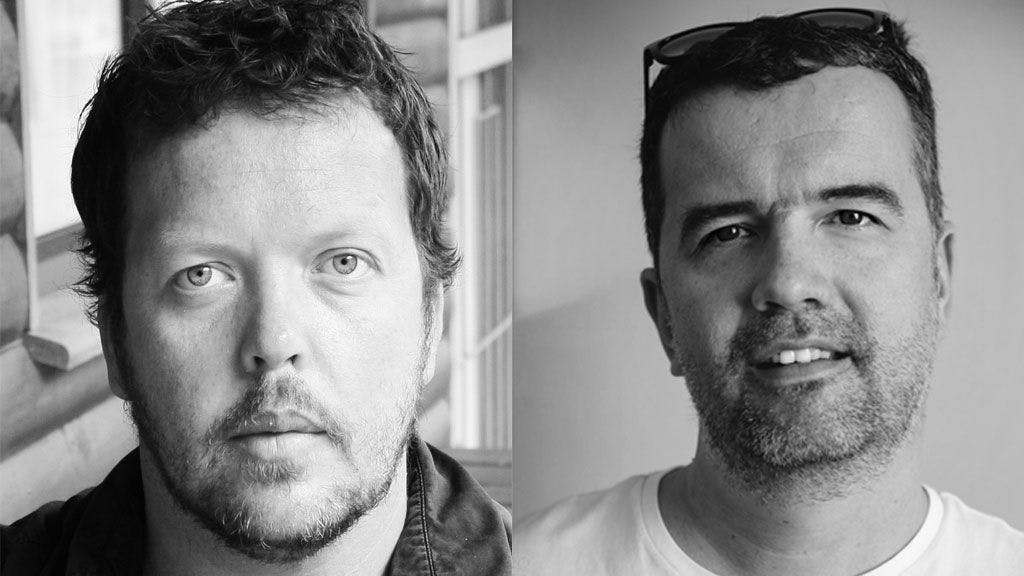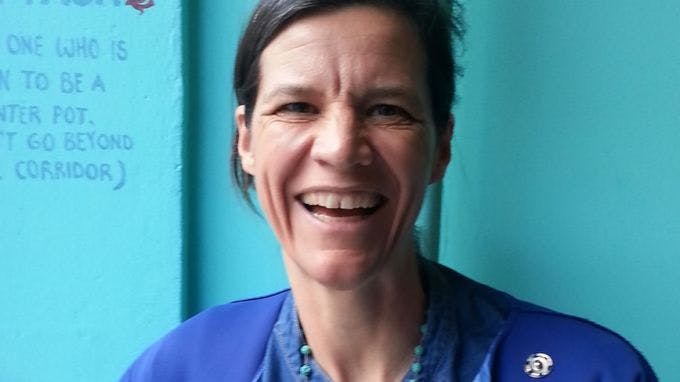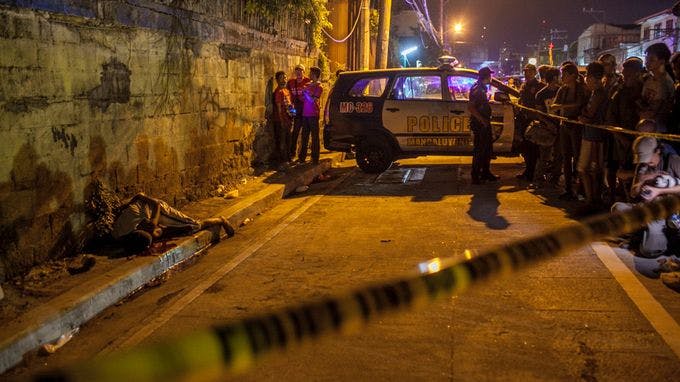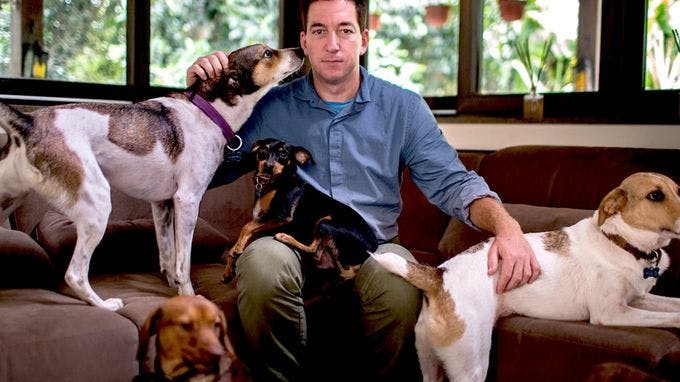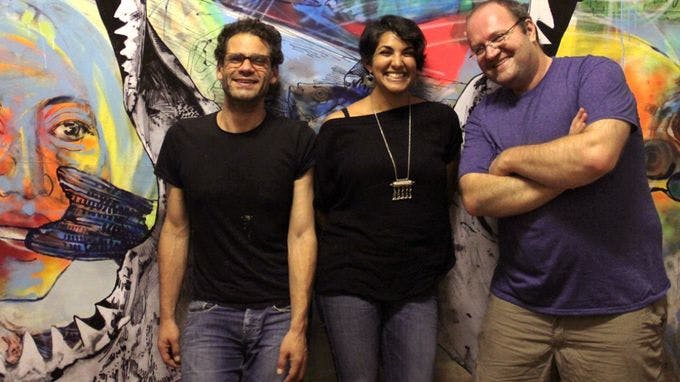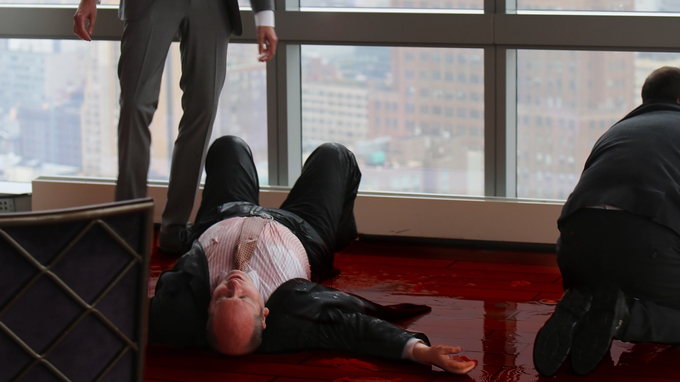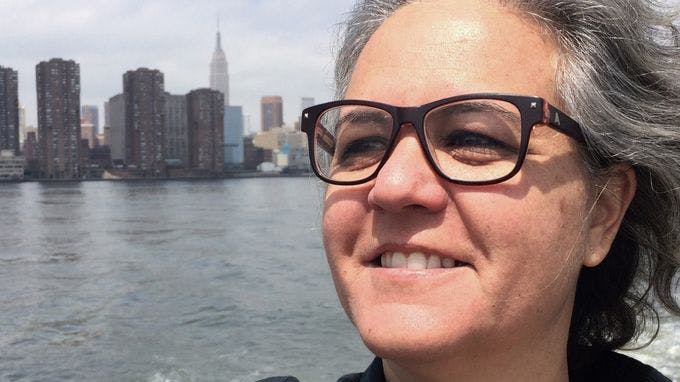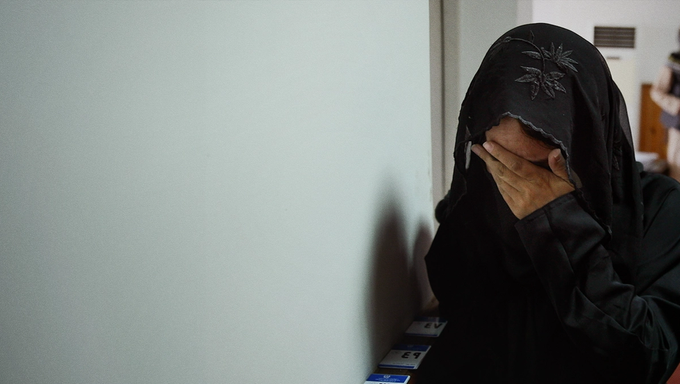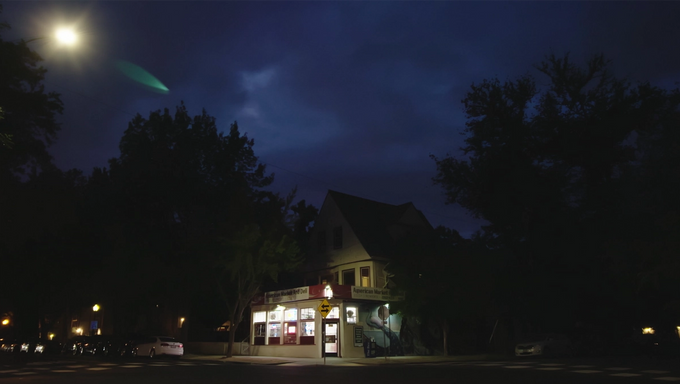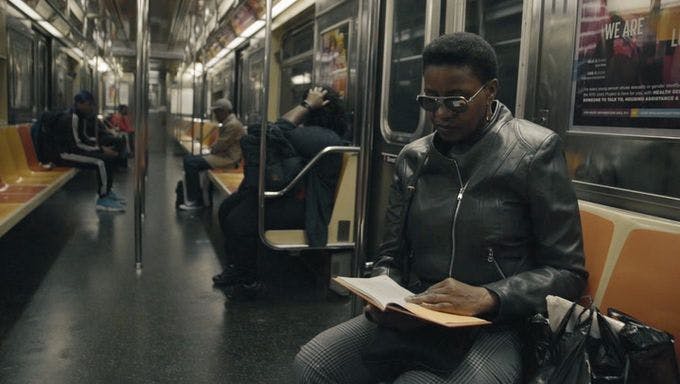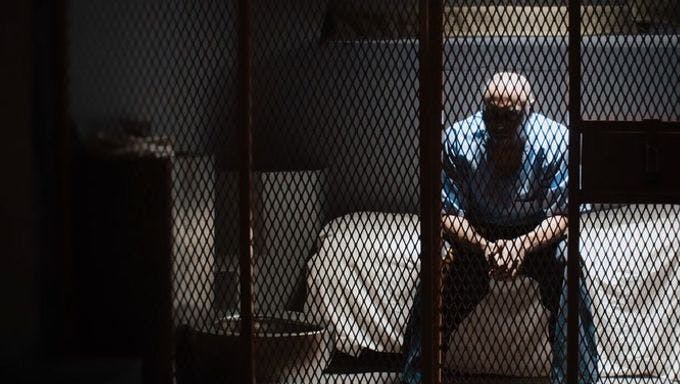François Verster and Simon Wood are South Africa-based filmmakers and the directors of Scenes from a Dry City, a new Field of Vision short about the water crisis in Cape Town.
The film looks at the terrifying march towards “Day Zero,” when the city’s water taps will be turned off due to prolonged drought, from a variety of perspectives, including: car washers, anti-privatization protesters, Christians praying for rain in a mass service, and well-to-do golfers on a lush private course. These vignettes are juxtaposed with images of a drought-stricken reservoir and the network of canals that carry an ever-decreasing trickle of water to Cape Town. Though “Day Zero” has reportedly been postponed, the core issues explored in the film—namely race, class, access, and privilege—remain relevant.
Scenes from a Dry City premiered at the International Documentary Film Festival Amsterdam (IDFA) in 2018 and later screened at Big Sky Documentary Film Festival, where it won the Mini-Doc Award. Verster and Wood recently spoke to Field of Vision about their award-winning film, what it was like to blend their filmmaking styles, and what they hope audiences will glean from their work.
What inspired you to make a film about the water crisis in Cape Town?
François Verster:Simon and I both live in Cape Town. At the beginning of last year, the public were suddenly receiving warnings that the taps may be turned off, and predictions were being made, ranging from exploding sewerage pipes to typhoid epidemics to social insurrection. Many wealthier Capetonians actually left the city for Johannesburg, the supermarkets ran out of bottled water after panic ensued, people started stockpiling, and there was a general sense of simply not knowing how life would proceed should there be no water. The government issued photos of water distribution points, which would be controlled by the army and would mean queues of tens of thousands of people every day. The public was asked to befriend elderly neighbors and to assist them when the time comes. Schools issued warnings of possible closure.
We were both intrigued by the way hidden social dynamics were coming to the fore in the process, and we both saw a great opportunity for a film that looked at Cape Town through the vehicle of a crisis that went across the board. I had made a film called Sea Point Days that consisted of vignettes of life in a specific part of the city, and Simon had made a film called Orbis, which uses powerful single visual scenes as a medium for storytelling. And we both felt that the situation presented a golden opportunity to deliver a highly creative insight into the bigger societal issues we have explored in our other films. I was in discussion with various people about doing something, and when the opportunity to do something for Field of Vision came up it totally made sense, both because of the urgent timeline and because of being able to contain a very big subject in a tight, limited form.
Simon Wood:Every man and his dog wanted to make a film about Cape Town being the first major city to run out of water last year. Most of these films were expository documentaries positioned around a sensationalist armageddon. I am not and never will be an environmental impact, social justice type of filmmaker. I saw an opportunity to use water as a lens to explore societal dynamics in a place which is rife with inequality. Thematically, I was interested in nature’s indifference to man, which allows the film to use water a neutral device to travel though Cape Town’s surreal maddening at the hands of a disinterested mother nature.
How did this collaboration come about? Had you worked together before?
Verster: We have been consulting on each other’s films and also developing a film called Zephany: The Hidden One together for some time. Because of the urgency involved in doing something on the water crisis, and because there were so many facets to cover, it made sense to try to work with another director. We at one point considered making a longer film that involved different directors from different parts of Cape Town, but in the end the short documentary form worked out very well for us.
Wood: François is South Africa’s greatest observational filmmaker, so I was obviously really keen to work with him! My films have been driven primarily by a strong visual aesthetic and less concerned with narrative, so I thought if we collaborated it would be an interesting clash of documentary personas, and by God it was! Oddly, I think the film works best when it intercuts between our separate styles: the golf scene in the empty canal, filmed by me, blends really well with François’s observation of the protest march. I hope these contrasting styles, opinions, ideas lead to something unsettling that connects with a broader idea around perception and reality.
You discuss showing not only the environmental impact but also the social and economic impact of the drought. Why did you think it was important to show those aspects as well?
Verster:I am primarily a social documentary filmmaker, so the human side, which is of course inseparable from environmental issues anyway, was always the entry point for me. As mentioned, the threat of water running out had a profound impact on Capetonians’ existential sense—it was as if society had been prodded in such a way so as to reveal both its fault lines and, perhaps also, its strengths and positive characteristics. In many ways Cape Town’s spatial geography is a monument to Apartheid planning, and now municipal resources are applied highly unequally across the city’s population. What was also illuminating was how many wealthier people would, for example, vocally complain about how car wash operations in the poor townships were wasting water, without any acknowledgement of the fact that in many of those areas a single tap could be serving an entire street. Or of the structural economic advantages involved in being able to dig well points or boreholes to keep gardens and swimming pools going in the wealthier areas. The water crisis cost the region over 30,000 jobs in the agriculture and tourism sectors, and of course the poorer employees were the first to go. The cost of municipal water itself shot up, and this was of course much harder for poorer households to accommodate. In the wealthiest areas, some house-owners continued watering their lawns as before, opting to pay the hefty fines—because they had the funds to do so—rather than saving water. On the other hand, there was also a very positive sense of people pulling together across race and class barriers towards a common cause.
Wood:I guess because people from privileged backgrounds, myself included, love to bang on about the environment, whilst for the majority of people in South Africa the main concern is how they will be able to provide for themselves and their families on a daily basis. These raw realities are somehow ignored and rarely discussed.
What was the process for gaining access for the ride-along with a member of local law enforcement that is featured in the film?
Verster:We had a very good relationship with Cape Town’s city police and had filmed with them a number of times before filming the chase sequencer in the film. The city was fairly open about what they were doing and the police in general, to our mind, seemed to want to cooperate with both the media and with the bigger debates that were going on. Yet it felt very strange and unsettling to be driving around in a police car filming people being booked for washing cars or watering their gardens, particularly in a place that has so many massive other societal problems.
Wood:I had been on several water operations with the police before I shot the car washer chase scene. It was fortunate that I was interviewing the officer in the car as the situation unfolded: the police officers in front of us were in an unmarked car and pulled up to the illegal car wash and all hell broke loose as they jumped out and tried to arrest the guys. It did feel fairly surreal to put so much effort into chasing men who were trying to make a day’s wage by washing cars. Everyone felt fairly deflated after the guys were arrested. But I think the film offers a not impossible view of a future where water is a precious entity and governments will fight to control it.
Were there any scenes that were particularly difficult to shoot due to issues of access, timing, et cetera?
Verster: We were hoping to film more of the excessive use of water by certain richer Capetonians. For example, we had planned to film how farmers—who have water concessions from government—deliver water by truck to private swimming pool owners. In an area close to where I live, a massive multi-apartment complex that boasts fourteen brand new swimming pools has just been constructed, which seems crazy given that the general understanding has been that private pools are no longer a luxury Cape Town can afford. Even municipal pools have been threatened with closure. But because of the sensitivity around this kind of abuse of privilege it was not possible, in the time span we had, to arrange access to filming this.
Wood:The film uses water as a vehicle to travel though Cape Town, so it was really important to me that this journey had a strong aesthetic. I spent a lot of time searching for strong compositional moments in different landscapes: I filmed in underground water tunnels, dams, rivers, under bridges, and obviously underwater. When the golfer got into the empty canal to play the shot, I hadn’t taken a weekend off in two months. It was a Sunday, and my partner Meghna was pissed off that I decided to spend the afternoon filming in an empty canal. I had been wandering around that space for two hours when he nearly hit me with his ball. It’s a rare moment where a really bad golf shot landed in an amazing location whilst the sun was in the right part of the sky, and the right lens was on my camera creating a beautiful compositional observational moment of which I am very proud and makes the many weekends and pissed-off wife all seem worth it. Annoyingly, because it’s a beautiful shot, people think its staged or fake, I promise you it isn’t.
Why did you choose to make a short film instead of a feature-length film about this particular subject?
Verster:As before, this was largely because of the time factor involved and also because the opportunity to make a piece for Field of Vision offered something altogether new for me. I have not made many short documentaries before and have generally tended to be skeptical about them in the sense that one cannot be immersed in a world or in a process in the way I usually associate with the documentary films I value. Yet once we started working, the relative freedoms allowed by the form became a source of genuine joy. I was amazed at how one can combine elements without needing the same amount of exposition, development or even justification. Switches of mode or tone can be made very rapidly. For example, when we get back to the car washers, the real sound environment is cut out and we move to a trickling-water sound, which we thought of as the “essence” of water in auditory form, accompanied by a bass rumble. The film somehow completely changes into something else right there - and we look at subsequent scenes very differently. My idea of documentary is that its value lies exactly in being able to combine different realities, modes of looking, even modes of reality in one space, and the short film somehow makes doing so a lot easier.
Wood: To quote Werner Herzog who combatively believes we must divorce documentary from mere investigative journalism and that the “fly-on-the-wall” approach is for “losers,” he puts it eloquently when he states: “Only by imagining and by creating and by fantasizing and bringing in deep dreams, all of a sudden puts you into a position where you start to see something deeper. You notice something that stays within you forever.” This is genuinely what I strive for, and I believe it’s far easier to take chances, present dreams and fantasies within a short film than it is a feature where we often slaves to narrative devices and economic pressures.
What do you hope people gain from watching Scenes from a Dry City?
Verster: I hope that the film works on various levels. Firstly, we would of course like to draw attention to the crisis itself, and to the social issues that are brought to the fore by it, and to how what is happening here might be a harbinger of future situations elsewhere in the world. Cape Town does have a specific set of circumstances, but it does seem as if what we experienced last year is going to become commonplace around the world. The debates around political responsibility, alternative water sources—such as desalination plants—socio-economic rights, privatization and so on are by no means resolved, and it would be good for different centers to engage on how problems are or are not being resolved. But the film also aims to work at a more existential level. One guiding idea we had was to try to think through what it would mean to see things from the perspective of water itself, one that is indifferent yet central to existence and binding everything together. The hope was that this would then also open up a different kind of look: one that is visual, emotional, perhaps at some level philosophical—at the very tough debates on race and economics raging in the country over the past few years—in a way, both the harsh divisions as well as the connectedness of Cape Town’s human population are revealed. And then of course, we wanted all of this to function partly through the cinematic qualities of the film, so that people have an experience of aesthetic beauty, or at least power, which allows a different—and possibly, at a push, deeper—kind of political engagement with reality at hand.
Wood:Beautiful! I’d like to end the interview by saying I agree with François.
Watch Scenes from a Dry Cityon Field of Vision.
